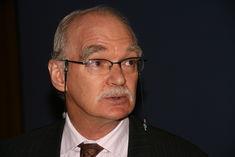
The blame for the obesity epidemic in the UK should not be laid at the door of the food industry alone, according to a senior food appetite researcher.
The rise of the obesity problem in the UK is down to over-consumption and under-exercise and the former, at least is a very difficult problem to address.
John Blundell, professor of BioPsycology at the university of Leeds, said: “It is too much food that makes us fat, but you can’t blame the food industry for that, it is part of a much bigger picture. Obesity is a product of consumerism and depends on abundance. We are omnivores and therefore have a massive choice. The whole world is a restaurant and psychologically, taste dominates our choice of food. We can do some things to mitigate against over-consumption, but we cannot effectively control it.”
Blundell’s beliefs stem from more than 25 years researching appetite control. He advocates “social engineering on a massive scale” as the way forward, adding that in trying to solve the problem, a distinction must be made between “helping some people and eradicating the epidemic of obesity”.
The key to the obesity issue, he said, is the constant conflict in the human brain between consumption inhibitors and stimulators. Eventually, in nearly all cases, the hedonic signals to the brain, which tell humans to eat more food for stimulation overcome the inhibition signals. “Our cognitive capacity cannot overcome the tendency to over-consume in the prevailing obesigenic environment,” he said.
It would be far easier to moderate human behaviour in the field of exercise, he argued. Between 20 and 40 per cent of energy expenditure - ie. exercise - is optional, whereas 100 per cent of our energy intake is behavioural and for people who over-eat, the problem is that we take in energy far more quickly and in greater volume than we expend it. “It is an unfair equation,” argued Blundell. “Humans have a natural predilection to fatty/sweet foods. And it is not the amount of food that we eat that necessarily makes the difference, but the energy content in that food. But it is the moment of choice between healthy and less healthy foods that our cognitive resources are most put to the test and that is when the hedonic pressures tend to dominate.



